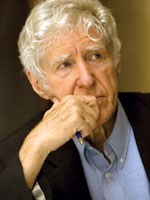Lester Brown’s Mission
 “We are in a race,” says Lester Brown, president of the Earth Policy Institute in Washington D.C. “Can we arrest the melting of the Greenland ice sheet before it spirals out of control and the world is faced with a 23-foot rise in sea level? Can we close coal-fired power plants fast enough to save the large glaciers in the Himalayas whose ice melts feed the major rivers of Asia? Can we stop deforestation in the Amazon before it dries out, becomes vulnerable to natural fires and releases an enormous amount of carbon into the atmosphere?”
“We are in a race,” says Lester Brown, president of the Earth Policy Institute in Washington D.C. “Can we arrest the melting of the Greenland ice sheet before it spirals out of control and the world is faced with a 23-foot rise in sea level? Can we close coal-fired power plants fast enough to save the large glaciers in the Himalayas whose ice melts feed the major rivers of Asia? Can we stop deforestation in the Amazon before it dries out, becomes vulnerable to natural fires and releases an enormous amount of carbon into the atmosphere?”
The Washington Post called Lester Brown “one of the world’s most influential thinkers” and Foreign Policy named him one of 2011’s Top 100 Global Thinkers, because for decades he has been warning us to change our trajectory or we’ll be in trouble. Now he believes we are.
As climate change spurs more extreme weather, including massive droughts, many countries are exhausting their natural resources through deforestation, soil erosion and the over-pumping of aquifers to keep up with rising food demands. The growing world population, along with increasing affluence and demands for meat and dairy products, and the use of grains for biofuels, intensify pressures on global agriculture. Huge demand for soybeans for livestock feed causes deforestation in Brazil, releasing more carbon into the atmosphere. Brown fears these factors could at any time trigger a world food crisis. In 2011, food prices hit a global high; continued rising prices could be catastrophic for the world’s poor, sparking riots and revolutions.
At age 78, Lester Brown is on a mission to explain these complex issues and offer strategies for dealing with them. Brown’s career began as a tomato farmer in New Jersey. He graduated from Rutgers University with a degree in agricultural science, and earned master’s degrees from the University of Maryland in agricultural economics and Harvard in public administration. In 1955, he lived in rural India, where the nexus between population, land and water became clear. Brown later worked for the U.S. Department of Agriculture, eventually heading its International Agricultural Development Service. In 1974, he founded the Worldwatch Institute, which published annual reports analyzing environmental issues. In 2001, Brown established the Earth Policy Institute, which is dedicated to planning for a sustainable future. He has written or coauthored over 50 books, the latest being World on the Edge: How to Prevent Environmental and Economic Collapse
(W.W. Norton & Company).
Brown has a special talent for connecting the dots between climate change, water, deforestation, food and overpopulation. And although he paints a dire picture, he also presents many strategies that could restructure the world energy economy to stabilize the climate. Undaunted by climate skepticism or the fact that climate change is rarely mentioned by current politicians, Brown is confident that increasing extreme weather events will make it clear that climate change is real and that we’re responsible for it.
“I know that social change comes very quickly sometimes,” he says. “And you can’t always anticipate it.” He cites the U.S. war mobilization after Pearl Harbor, the fall of the Berlin Wall, the Arab Spring, and notes how the nuclear meltdown in Fukushima, Japan, changed the world’s thinking about the safety of nuclear power.

Brown sees reasons for hope. U.S. carbon emissions have declined 7% in the last four years, and he believes they will drop 20% or more by 2020. Although natural gas use rose 6%, oil use is down 11% and coal use is down 10%. Oil consumption has decreased, Brown says, because teens now socialize via the Internet instead of in cars, and as baby boomers retire, their gasoline use falls by 30% to 50%. Fuel efficiency standards have risen—by 2025, the average car will use half as much gasoline as in 2010. He credits the Sierra Club’s Beyond Coal campaign with a de facto moratorium on new coal plants and the drop in coal use. Moreover, 71 of the remaining 492 coal-fired power plants are scheduled to close within a few years. Other positive global signs include Desertec, a huge European project tapping the solar resources of North Africa; China’s construction of enormous wind-generating complexes; and bike-sharing programs in Washington D.C., Chicago and New York.
Nonetheless, to save the Greenland ice sheet—a massive body of ice covering nearly 80% of Greenland’s surface—Brown believes we must cut carbon emissions 80% by 2020. Where does that leave individuals? “We should each pick an issue that’s important to us, find some friends that share that concern and go to work, whether it’s closing coal-fired power plants, stabilizing world population or developing recycling programs,” Brown says. Brown will continue to lead the way. Look for his Full Planet, Empty Plates: The New Geopolitics of Food (W.W. Norton & Company) this September, and his autobiography, Breaking New Ground: A Personal History, in January 2013.
RENEE CHO is a freelance environmental writer in New York City and a staff blogger for The Earth Institute at Columbia University.


